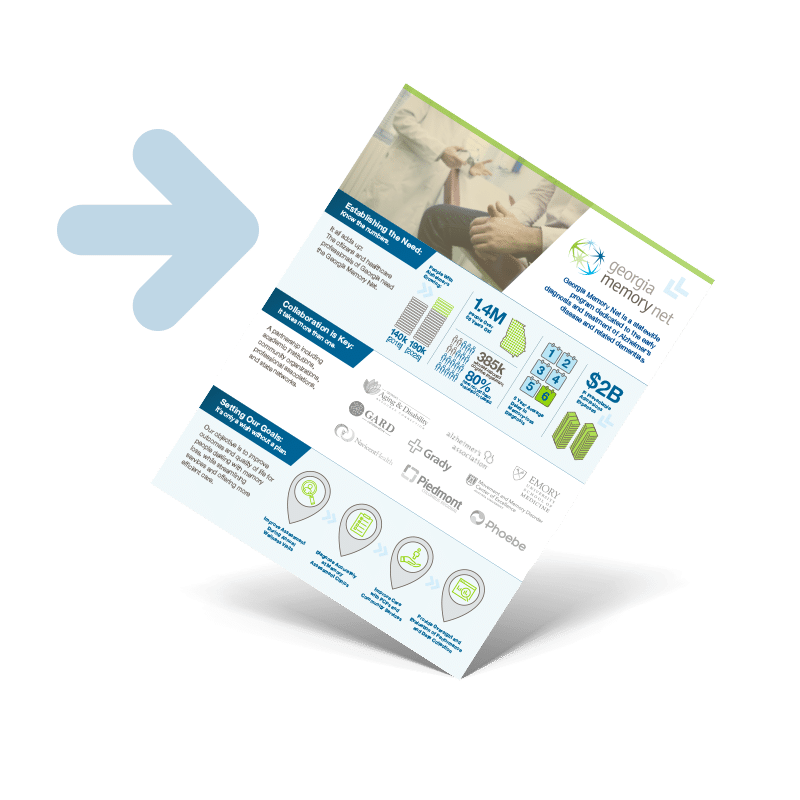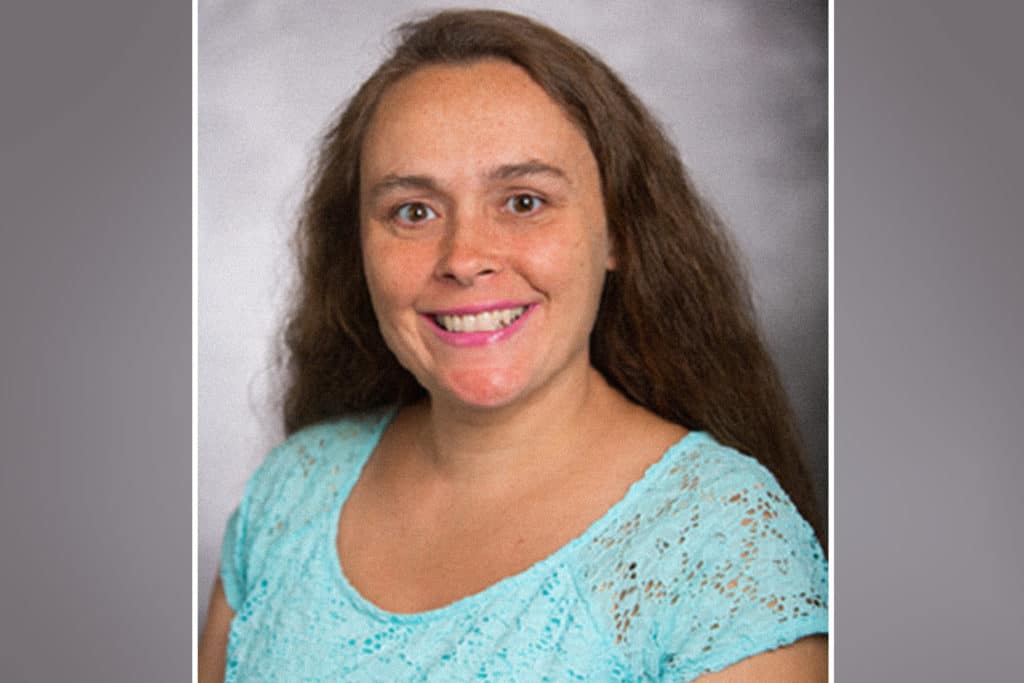Health Economist Sees New Hope in Fight Against Alzheimer’s, Other Types of Dementia
Dr. Miranda Moore is an Assistant Professor in Family and Preventive Medicine at Emory University who has studied the health care workforce and its impacts on patient health. When it comes to caring for elderly populations, including offering patients services in specialties such as neurology and geriatrics, Dr. Moore is excited about a new program available in the State of Georgia, Georgia Memory Net.
“When I found out that this program was actually implemented with its full budget intact, I thought it was fantastic news,” she shared. “It was an amazing moment because I think everyone in Georgia at some point is going to be touched by Alzheimer’s Disease or another form of dementia, whether they or a family member has it. Dementia is highly likely to impact everyone considering our aging population and increased life span.”
Why does this researcher feel that Georgia Memory Net is well positioned to help our aging population in the future? Dr. Moore cited the work she has done examining the provider workforce, looking at the resources that are available compared to the needs of the population. This community needs assessment determined that screenings for cognitive impairment, such as those conducted as part of the Annual Wellness Visit (AWV) covered by Medicare, were significantly underutilized. Such screenings are vital as they provide an early warning of potential cognitive issues.
Why early screenings are so important
“The reality is that with conditions such as Alzheimer’s, there’s much that we can do to make the trajectory of the disease better, in terms of pharmacological treatments, diet, lifestyle, etc.,” stated Dr. Moore. “There are some medications that can help to give patients a longer period of time with less severe symptoms from the disease, but all of that is hinged on having a diagnosis earlier. Therefore one of the goals of Georgia Memory Net is to work with primary care physicians, patients and their families to increase cognitive screenings through Annual Wellness Visits.”
“Currently, only 30% of Medicare fee-for-service beneficiaries are attending their AWVs,” she continued. “One of the objectives of Georgia Memory Net is to advocate not just to primary care providers, but to encourage patients to have these visits. If in five years we can move the needle for AWVs up to 50%, we’ll have a major impact on all people living in the state of Georgia.”
“I just think of the difference this could make for my own life and family,” she added. “I believe my Grandfather has Alzheimer’s disease, but he’s one of those people that’s never been specifically diagnosed. I think of the direct impact on my life if my Grandfather could go through the Georgia Memory Net program.”
New support for patients and families
Beyond helping with screenings, Georgia Memory Net has opened five Memory Assessment Clinics (MACs) where primary care physicians can refer patients when cognitive issues have been identified. At the MACs, patients can receive a more specific diagnoses of their condition and clinicians will put together a treatment plan that patients and their families can bring back to their doctor. But Georgia Memory Net goes beyond treating the medical condition alone in how it supports patients and their partners in care.
“Patients will not only have a much more robust treatment plan, they will also have the connections to community support that the patient—and their care partner–need to really increase their quality of life as they go through the remainder of that life with this disease,” explained Dr. Moore. “There’s a wide spectrum in terms of these linkages to community services. Patients and their families will return from a MAC with reference materials on the nature of their disease, and what does life look like living with the disease as a patient, or as a caregiver for someone who has dementia. I think that information is crucial because when patients and care partners receive a diagnosis in a primary care or neurology setting, they’re often in shock. They’re not necessarily retaining the information about the disease, it’s symptoms, or its trajectory over time.”
Enhanced, comprehensive care
“Georgia Memory Net is also about the connection to services that a primary care physician may not be aware of,” Dr. Moore continued. “Agencies such as Area Agencies on Aging (AAAs) offer a huge spectrum of services. Here’s an example: If the patient and the care partner are facing any issues like transportation for medical treatments, or if they’re facing housing issues, they can link to community services to assist with their needs through the triple A’s and also referrals to private organizations such as the Alzheimer’s Association or the Roselynn Carter Institute for Caregiving. Georgia Memory Net Community Services Educators (CSEs) will be able to help them to navigate the system of asking for and receiving help for any issues they may have.”
“Through these organizations, there is also very robust support to the care partners, as these groups understand what they’re going through,” she added. “The AAA’s offer structured peer support groups for care partners so they know that they’re not alone in the frustrations they face in providing care for patients with dementia. They also offer home services such as a fall risk prevention screening, where a professional comes into the patient’s home and evaluates any fall risks such as loose rugs, etc. And that’s just one example of the services available. Many of these services may also be free for the patients and their care partners.”
Dr. Moore pointed out that whenever there are any fees associated with services, they are assessed on a sliding scale based on income and need so that a family is not burdened with expenses while trying to care for a loved one. And she feels that in many cases families don’t realize just how much support is available to meet their needs. “Take the example of my grandfather and my family,” she stated. “As my grandfather starts to develop motor coordination symptoms, he’s going to have issues moving around his house. This is the type of thing that we had not even considered previously. But help is available through Georgia Memory Net in the form of someone who has already thought through the types of issues we my encounter as his disease progresses. I think this type of support can be very relieving for patients and their families.”
“What we’re seeing is that Georgia Memory Net is providing enhanced access to care and community services for patients and their care partners facing Alzheimer’s and related dementia,” Dr. Moore concluded. “I believe this is going to have a phenomenal impact in the future as our state population continues to age, live longer lives, and face more cognitive issues as a result.”
Miranda Moore, Assistant Professor at Emory University School of Medicine
Dr. Moore is an Assistant Professor in the Department of Family and Preventive Medicine at Emory University. Before joining the faculty at Emory, Dr. Moore was an economist at the Robert Graham Center for Policy Studies in Family Medicine and Primary Care within the American Academy of Family Physicians. She has also worked for the U.S. Department of Labor, Employee Benefits Security Administration in the Office of Policy and Research, Division of Research and Economic Analysis. She has taught Statistics at Hofstra University and Game Theory at Stony Brook University.
Dr. Moore’s current research centers on primary care access to care, including:
- Telehealth and advanced access
- Primary care workforce, including demand and supply of providers, practice characteristics, and patient panel size
- Primary care delivery/physician practice transformation, with an emphasis on care management, patient complexity, physician reimbursement, PCMH transformation and quality measures
Dr. Moore received her MA (2006) and PhD (2010) in Economics from Stony Brook University in Stony Brook, NY.
Georgia Memory Net at a Glance
What is Georgia Memory Net and why does it exist? There’s so much information about Alzheimer’s and related dementias in Georgia, and how to diagnose and treat them, that it can become overwhelming. We’ve done our best to simplify the info into a clear one-page infographic.



